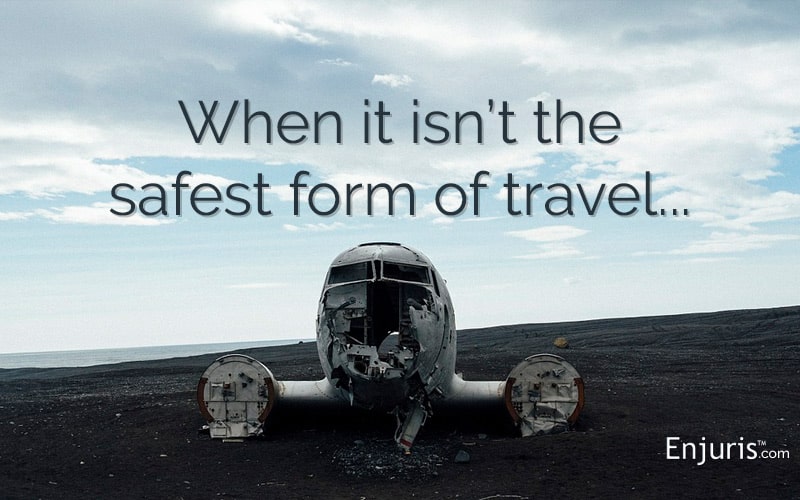
Learn how you can recover financial compensation via a personal injury lawsuit
Aviation enthusiasts often state that air travel is the safest way to travel. Accident statistics from the National Transportation Safety Board support this claim as there were only 412 fatalities due to an aviation accidents versus 37,00 deaths due to car accidents in 2016.
Georgia residents and tourists have ample opportunities to enjoy recreational plane use due to the temperate climate. Nevertheless, accidents are still possible as approximately 1,200 civil accidents happen each year in the United States. When disaster strikes in the air, serious injuries and fatalities are common. A personal injury lawsuit is typically the best method for you to recover the inevitable medical bills and other expenses from the accident.
What is considered an aviation accident?
Though most accidents that result in a personal injury lawsuit involve private planes, other aviation accidents can result in injuries and hefty medical bills, if not death. The following incidents qualify as aviation accidents and typically require the assistance of a personal injury attorney in order for an accident victim or their family member to recover damages:
- Glider accidents
- Skydiving accidents
- Balloon accidents
- Weather-related accidents
- Military aviation accidents
- Banner aircraft accidents
- Helicopter accidents
- Aviation product liability
- Drone accidents
- Air traffic control accidents
- Airport liability
- Major airline accidents
- General airline accidents
If any of the above happened to you or a loved one, an experienced aviation accident attorney is your best shot at recovering the compensation you need.
What are common causes of airplane accidents?
Finding what caused a plane, jet or helicopter to crash is challenging and can take investigators quite a while to determine – sometimes years, in fact. This must happen before negligence can be determined.
Federal Aviation Administration (FAA) investigators occasionally must coordinate with foreign officials to extract the “black box,” a device capable of surviving a crash that’s able to record the last few moments before an accident.
Crashes (or “incidents” as FAA investigators call them) can happen for any number of reasons:
- Defective equipment or technical error: Was the navigational equipment working properly? A products liability suit could potentially be initiated against the manufacturer.
- FAA regulation violation: These accidents could occur from using the wrong runway, an altitude deviation, airspace violation, inadequate fuel reserves, or multiple planes on a runway.
- Piloting error: Was the pilot intoxicated? Unconscious? Sick? Attacked by a hijacker? Somehow negligent or careless? Grandstanding or being reckless? Sleeping at the wheel? Mishandling the controls? Using his phone?
- Fueling or intake problem: If there wasn’t enough fuel for the plane to reach its final destination, this would likely be a case of gross negligence.
- Air traffic control error: Sometimes the error lies with the people on the control tower or the landing strip.
- Faulty maintenance or structural issue: Was the plane in shape to fly? Was everything properly checked prior to taking off?
- Other negligence: This could include flight crew negligence, such as failing to do a proper safety inspection, or corporate negligence.
Which parties are liable after a plane crash?
- Manufacturer: When a product is found to be defective, the manufacturer can be held liable for any injuries that the defect caused. This theory is known as “strict liability.” If a manufacturer puts a product into the stream of commerce, it’s responsible for that product, no matter where it ends up.
- Common carrier: Commercial airlines are held to high standards because they present themselves to the public as “common carriers.” They carry any passenger who purchases a ticket from them. The FAA is in charge of rules and regulations regarding common carriers, which are more stringent than those around private carriers/personal planes.
- Owner/operator: The owner and operator of a private plane may be the same person or not. If the owner of an aircraft was negligent or reckless while operating an aircraft or negligently allowed an unfit pilot to fly the plane, then they will likely be held liable for damages to victims and their families. If the pilot didn’t own the plane, the owner of the plane is also liable for the pilot’s actions. This liability falls under the theory of vicarious liability, or respondeat superior, which is when the employer is responsible for the actions of their employee during the course of employment.
What rights do family members have when an aviation accident occurs?
Prior to the 1990s, attorneys were notorious “ambulance chasers” for plane crashes. Lawyers were said to have shown up at funerals, distributing business cards at every chance they had. As a result, limits on attorney solicitation were imposed by the Aviation Disaster Family Assistance Act of 1996.
The Act also did other helpful things for the families of aviation incident victims. It made the federal government support the families by requiring the airlines and the National Transportation Safety Board to provide the following services:
- Victim identification and forensic identification
- Language translation
- Daily briefings
- Safe grieving places that would be uninterrupted by the press or lawyers
- Memorial services
- Communications with foreign governments
- Mental health and counseling
- Meetings with the families of victims
The airline was also responsible for establishing a toll-free telephone line for the families, providing a list of all passengers on the flight, informing families of the death of family members, and assisting the families with travel to the location of the accident.
The Act, however, doesn’t assist or prevent a family from pursuing a wrongful death claim on behalf of their lost loved one. In Georgia, a victim’s family can pursue damages such as:
- Full value of life damages
- Medical expenses and some additional funeral costs
- Punitive damages
Depending on the size of plane involved in the crash, a class action lawsuit may be initiated to award damages to each of the victims’ families. Both aviation accident lawsuits and class action cases are complicated and can be overwhelming, especially after a tragedy.
If you lost a loved one in an airplane crash, we encourage you to use our attorney directory to find a Georgia personal injury attorney near you.
See our guide Choosing a personal injury attorney.

